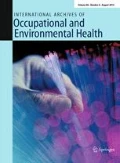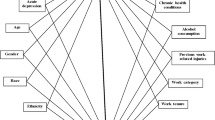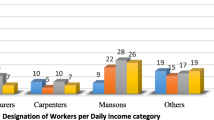Abstract
Objectives
To assess the roles of job demands, living conditions and lifestyle in occupational injury.
Methods
The sample included 2,888 workers, aged ≥15 years, randomly selected from the north-eastern France. The subjects completed a mailed questionnaire. Data were analyzed with adjusted odds ratios (ORa) computed with the logistic model.
Results
In total, 9.2% of workers had an injury during the previous 2 years. The high job demands: tasks at height, handling objects, pneumatic tools, other vibrating hand tools, work in adverse climate, physical workload, vibrating platform, machine tools, cold, heat, awkward posture, noise, hammer, and pace had crude odds ratios between 1.81 and 5.25 for injury. A strong exposure–response relationship was found between the cumulated job demands (CJD, defined by their number) and injury: OR 1.88 (95% CI 1.23–2.87) for CJD1, 4.39 (2.98–4.46) for CJD2–3, and 9.93 (6.70–14.7) for CJD ≥ 4, versus CJD0. These ORs decreased to 1.68, 3.70, and 7.15 respectively, when adjusted for sex, age, and living conditions/lifestyle confounders; and to 1.54, 2.99, and 5.45 respectively when also adjusted for job category. The following factors had significant ORa: age <30 years (1.54, 1.12–2.12), male (1.64, 1.18–2.30), smoking (1.60, 1.22–2.10), musculoskeletal disorders (1.54, 1.17–2.04), and frequent drug use for fatigue (2.03, 1.17–3.53). The workmen, farmers/craftsmen/tradesmen, and foremen had a 5.7–8.7-fold while the clerks and technicians a 2.7–3.6-fold higher risk compared with upper class. The risk associated with CJD was twofold higher among the workers aged ≥40 or with frequent drug use for fatigue compared with the others. Obesity had ORa 2.05 (1.11–3.78) among the subjects aged ≥40, and excess alcohol use had ORa 2.44 (1.26–4.72) among those free of disease.
Conclusions
This study identified a wide range of job demands and living conditions/lifestyle which predicted injury. Preventive measures should be conducted to reduce job demands and to help workers to be aware of the risk and to improve their living conditions/lifestyle.
Similar content being viewed by others
References
Akerstedt T, Knutsson A, Westerholm P, Theorell T, Alfredsson L, Kecklund G (2004) Mental fatigue, work and sleep. J Psychosom Res 57:427–433
Aronne LJ (2002) Classification of obesity and assessment of obesity-related health risks. Obes Res 10(Suppl 2):105s–105s
Baudier F, Arène J (1997) Baromètre santé adultes 95/96. Editions CFES, Paris
Bhattacherjee A, Chau N, Otero Sierra C, Legras B, Benamghar L, Michaely JP, Ghosh AK, Guillemin F, Ravaud JF, Mur JM, Lorhandicap group (2003) Relationships of job and some individual characteristics to occupational injuries in employed people: a community-based study. J Occup Health 45:382–391
Caisse nationale de l’assurance maladie des travailleurs salariés (CNAMTS) (2002) Statistiques financières et technologiques des accidents du travail—1998–2000. CNAMTS, Paris
Challier B, Chau N, Predine R, Choquet M, Legras B (2000) Associations of family environment and individual factors with tobacco, alcohol and illicit drug uses in adolescents. Eur J Epidemiol 16:33–42
Chau N, Mur JM, Benamghar L, Siegfried C, Dangelzer JL, Français M, Jacquin R, Sourdot A (2004a) Relationships between certain individual characteristics and occupational accidents for various jobs in the construction industry: a case-control study. Am J Ind Med 45:84–92
Chau N, Mur JM, Touron C, Benamghar L, Dehaene D (2004b) Correlates of occupational injuries for various jobs in railway workers: a case-control study. J Occup Health 46:272–280
Chau N, Bhattacherjee A, Bertrand JP, Meyer JP, Guillemin F, Ravaud JF, Ghosh AK, Mur JM, Lorhandicap group (2005a) Associations of occupational hazards and individual characteristics with occupational injuries and disabilities in Lorraine coal miners. In: International symposium on advances in mining technology and management, Kharagpur, 30 November–2 December
Chau N, Ravaud JF, Otero Sierra C, Legras B, Macho J, Guillemin F, Sanchez J, Mur JM, Groupe Lorhandicap (2005b) Prevalence of impairments and social inequalities: a community-based study in Lorraine. Rev Epidemiol Sante Publ 53:1–15
Chau N, Gauchard G, Dehaene D, Benamghar L, Touron C, Perrin P, Mur JM (2007) Contributions of occupational hazards and human factors in occupational injuries and their associations with job, age and type of injuries in railway workers. Int Arch Occup Environ Health 80:517–525
Cicconetti P, Riolo N, Priami C, Tafaro L, Ettore E (2004) Risk factors for cognitive impairment. Recenti Prog Med 95:535–545
Cohidon C, Alla F, Chau N, Michaely JP, groupe Lorhandicap (2005) Tabac, alcool et médicaments psychotropes en Lorraine—Enquête épidémiologique en population générale. Sante Publique 17:325–338
ESEMeD/MHEDEA 2000 investigators (2004) Psychotropic drug utilization in Europe: results from the European study of the epidemiology of mental disorders (ESEMeD) project Acta Psychiatr Scand 109(Suppl 420):55–64
Etter JF, Pernejer TV (1997) Analysis of non-response bias in a mailed health survey. J Clin Epidemiol 50:1123–1128
Falissard B (1998) Comprendre et utiliser les statistiques dans les sciences de la vie. 2ème édn. Masson, Paris
Froom P, Melamed S, Kristal-Boneh E, Gofer D, Ribak J (1996) Industrial accidents are related to relative body weight: the Israeli CORDIS study. Occup Environ Med 53:832–835
Gauchard G, Chau N, Mur JM, Perrin P (2001) Falls and working individuals: role of extrinsic and intrinsic factors. Ergonomics 44:1330–1339
Gauchard GC, Chau N, Touron C, Benamghar L, Dehaene D, Perrin PP, Mur JM (2003) Individual characteristics in occupational accidents due to imbalance: a case-control study in the employees of a railway company. Occup Environ Med 60:330–335
Gauchard GC, Deviterne D, Guillemin F, Sanchez J, Perrin P, Mur JM, Ravaud JF, Chau N, Lorhandicap group (2006) Prevalence of sensorial and cognitive disabilities and falls, and their relationships: a community-based study. Neuroepidemiol 26:108–118
Ghosh AK, Bhattacherjee A, Chau N (2004) Relationships of working conditions and individual characteristics with occupational injuries: a case-control study in coal miners. J Occup Health 46:470–480
Groupe de recherche Lorhandicap: Chau N, Guillemin F, Sanchez J, Ravaud JF, André JM, Michaely JP, Caria A, Dazord A, Guillaume S, Legras B, Otero Sierra C, Meyer JP, Bourgey G, Tubiana-Rufi N, Méjean L, Choquet M, Schléret Y, Ticheur MV, Chantome F, Cnockaert JC, Mur JM (2000) Approches méthodologiques dans une enquête épidémiologique sur les handicaps en Lorraine. Handicap Revue de Sciences Humaines et Sociales 88:1–23
Harma M, Suvanto S, Popkin S, Pulli K, Mulder M, Hirvonen K (1998) A dose-response study of total sleep time and the ability to maintain wakefulness. J Sleep Res 7:167–174
Hashimoto H, Nomura K, Yano E (2004) Psychosomatic status affects the relationship between subjective hearing difficulties and the results of audiometry. J Clin Epidemiol 57:381–385
Hoffstein V (2002) Relationship between smoking and sleep apnea in clinic population. Sleep 25:519–524
Houtman IL, Goudswaard A, Dhondt S, van der Grinten MP, Hildebrandt VH, van der Poel EG (1998) Dutch monitor on stress and physical load: risk factors, consequences, and preventive action. Occup Environ Med 55:73–83
Institut National de la Statistique et des Etudes Economiques (INSEE) (1993) Recensement de la population de 1990. Sondage au ¼. INSEE. INSEE, Nancy
Institut National de la Statistique et des Etudes Economiques (INSEE) (2006) France métropolitaine—Enquête annuelle de recensement 2004. http://www.insee.fr/fr/recensement/nouv_recens/resultats/repartition/chiffres_cles/national/france-metropolitaine.pdf
Jorgensen K (1998) Concepts of accident analysis. In: International Labour Office (ed) Encyclopaedia of occupational health and safety. Chapter VIII. Accidents and safety management—accident prevention, vol. 3, 4th edn. ILO, Genova
Kalmijn S, Van Boxtel MPJ, Verschuren MWM, Jolles J, Launer LJ (2002) Cigarette smoking and alcohol consumption in relation to cognitive performance in middle age. Am J Epidemiol 156:936–944
Kant IJ, Bültmann U, Schröer KAP, Beurskens AJHM, van Amelsvoort LGPM, Swaen GMH (2003) An epidemiological approach to study fatigue in the working population: the Maastricht cohort study. Occup Environ Med 60(Suppl I):i32–i39
Kostova V, Koleva M (1999) Back disorders (low back pain, cervicobrachial and lumbosacral radicular syndromes) and some related risk factors. J Neurol Sci 192:17–25
Leigh J, Macaskill P, Kuosma E, Mandryk J (1999) Global burden of disease and injury due to occupational factors. Epidemiology 10:626–631
Lewis RJ, Friedlander BR, Bhojani FA, Schorr WP, Salatich PG, Lawhorn EG (2002) Reliability and validity of an occupational health history questionnaire. J Occup Environ Med 44:39–47
Lorhandicap group: Chau N, Ravaud JF, Bourgkard E, Sanchez J, Choquet M, Meyer JP, Otero Sierra C, Michaely JP, Legras B, Guillemin F, Bhattacherjee A, Guillaume S, Dazord A, Méjean L, Tubiana-Rufi N, Schléret Y, Mur JM (2004) Relationships of demanding work conditions with fatigue and psychosomatic disorders: a community-based study. Occup Environ Med 61:e46–e46
Mathiowetz V, Kashman N, Volland G, Weber K, Dowe M, Rogers S (1985) Grip and pinch strength: normative data for adults. Arch Phys Med Rehabil 66:69–74
McCaig LF, Burt CW, Stussman BJ (1998) A comparison of work-related injury visits and other injury visits to emergency departments in the United States, 1995–1996. J Occup Environ Med 40:870–875
Melamed S, Yekutieli D, Froom P, Kristal-Boneh E, Ribak J (1999) Adverse work and environmental conditions predict occupational injuries. The Israeli cardiovascular occupational risk factors determination in Israel (CORDIS) study Am J Epidemiol 150:18–26
Munoz B, West S, Rubin GS, Schein OD, Fried LP, Bandeen-Roche K (1999) Who participates in population based studies of visual impairment? The Salisbury eye evaluation project experience. Ann Epidemiol 9:53–59
Nelson HD, Nevitt MC, Scott JC, Stone KL, Cummings SR (1994) Smoking, alcohol, and neuromuscular and physical function of older women. Study of Osteoporotic Fractures Research Group. JAMA 273:1825–1831
Organisation Mondiale de la Santé (OMS) (1988) Classification internationale des handicaps: déficiences, incapacités et désavantages. Un manuel de classification des conséquences des maladies. Paris: OMS / CTNERHI / Les Editions INSERM
Otero Sierra C, Chau N, Macho JM, Cipponeri S, Guillaume S, Michaely JP, Mur JM, Lorhandicap group (2002) Musculoskeletal disorders for various sociooccupational categories in a French general population: a community-based study. 16th EPICOH. Barcelona
Paeratakul S, White MA, Williamson DA, Ryan DH, Bray GA (2002) Sex, race/ethnicity, socioeconomic status, and BMI in relation to self-perception of overweight. Obes Res 10:345–350
Pan American Health Organization, World Health Organization. Workers’ health in the region of the Americas (1999) 124th session of the executive committee. Washington, D.C., 21–25 June 1999, http://www.paho.org/English/gov/ce/ce124_18.pdf
Room R, Babor T, Rehm J (2005) Alcohol and public health. Lancet 365:519–530
Smith GS, Veazie MA (1998) Principles of prevention: the public health approach to reducing injuries in the workplace. In: International Labour Office (ed) Encyclopaedia of occupational health and safety. Chapter VIII. Accidents and safety management—Accident prevention, vol 3, 4th edn. ILO, Genova, pp 56.1–56.42
Sprince NL, Park H, Zwerling C, Lynch CF, Whitten PA, Thu K, Gillette PP, Burmeister LF, Alavanja MC (2002) Risk factors for machinery-related injury among Iowa farmers: a case-control study nested in the agricultural health study. Int J Occup Health 8:332–338
Tianwu H, Watanabe Y, Asai M, Shimizu K, Takada S, Mizukoshi K (1995) Effects of alcohol ingestion on vestibular function in postural control. Acta Otolaryngol (Stockh) Suppl 519:127–131
Turvey CL, Schultz S, Arndt S, Wallace RB, Herzog R (2000) Memory complaint in a community sample aged 70 and older. J Am Geriatr Soc 48:1435–1441
Van Tuinen M, Land G (1986) Smoking and excess sick leave in a department of health. J Occup Med 28:33–35
Wells S, Macdonald S (1999) The relationship between alcohol consumption patterns and car, work, sports and home accidents for different age groups. Accid Anal Prev 31:663–665
Zwerling C, Whitten PS, Davis CS, Sprince NL (1997) Occupational injuries among workers with disabilities: the national health interview survey, 1985–1994. JAMA 278:2163–2166
Acknowledgments
The authors would like to thank D Saouag, M Weiss, M Depesme-Cuny, and B Phélut for their help in the study. The work is granted by the Pôle Européen de Santé.
Author information
Authors and Affiliations
Consortia
Corresponding author
Additional information
Lorhandicap group: N Chau, F Guillemin, JF Ravaud, J Sanchez , S Guillaume, JP Michaely, C Otero Sierra, B Legras, A Dazord, M Choquet, L Méjean, N Tubiana-Rufi, JP Meyer, Y Schléret, JM Mur
Rights and permissions
About this article
Cite this article
Chau, N., Bourgkard, E., Bhattacherjee, A. et al. Associations of job, living conditions and lifestyle with occupational injury in working population: a population-based study. Int Arch Occup Environ Health 81, 379–389 (2008). https://doi.org/10.1007/s00420-007-0223-y
Received:
Accepted:
Published:
Issue Date:
DOI: https://doi.org/10.1007/s00420-007-0223-y




